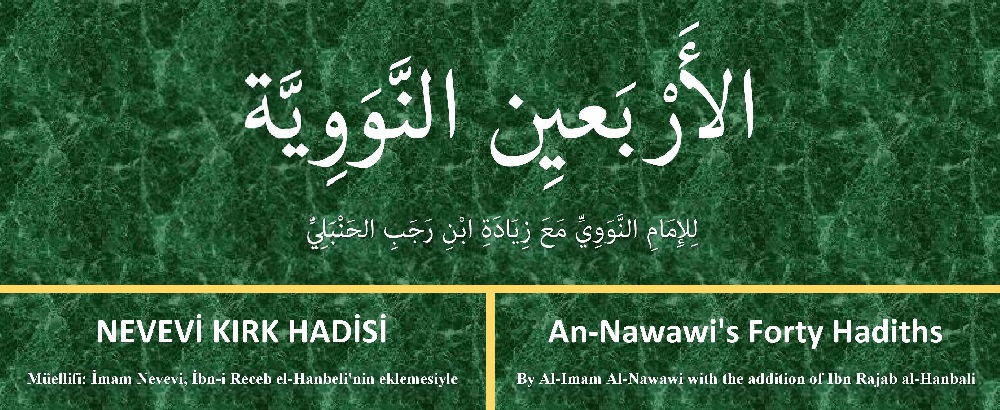[ 37 ] طط¯ظٹط«: "ط¥ظ†ظ‘ظژ ط§ظ„ظ„ظ‡ظژ ظƒظژطھظژط¨ظژ ط§ظ„ظ’طظژط³ظژظ†ظژط§طھظگ ظˆظژط§ظ„ط³ظ‘ظژظٹظ‘ظگط¦ظژط§طھظگ" Allأ¢hu Teأ¢la ve Tekaddes Hazretleri hasenأ¢t ile seyyiأ¢tı yazmış How deeds are recorded |

[ 37 ]
حديث: "إنَّ اللهَ كَتَبَ الْحَسَنَاتِ وَالسَّيِّئَاتِ".
عَنْ ابْنِ عَبَّاسٍ رَضِيَ اللهُ عَنْهُمَا عَنْ رَسُولِ اللهِ صَلَّى اللهُ عَلَيْهِ وَسَلَّمَ فِيمَا يَرْوِيهِ عَنْ رَبِّهِ تَبَارَكَ وَتَعَالَى، قَالَ: "إنَّ اللهَ كَتَبَ الْحَسَنَاتِ وَالسَّيِّئَاتِ، ثُمَّ بَيَّنَ ذَلِكَ، فَمَنْ هَمَّ بِحَسَنَةٍ فَلَمْ يَعْمَلْهَا كَتَبَهَا اللهُ عِنْدَهُ حَسَنَةً كَامِلَةً، وَإِنْ هَمَّ بِهَا فَعَمِلَهَا كَتَبَهَا اللهُ عِنْدَهُ عَشْرَ حَسَنَاتٍ إلَى سَبْعِمِائَةِ ضِعْفٍ إلَى أَضْعَافٍ كَثِيرَةٍ، وَإِنْ هَمَّ بِسَيِّئَةٍ فَلَمْ يَعْمَلْهَا كَتَبَهَا اللهُ عِنْدَهُ حَسَنَةً كَامِلَةً، وَإِنْ هَمَّ بِهَا فَعَمِلَهَا كَتَبَهَا اللهُ سَيِّئَةً وَاحِدَةً".

Allâhu Teâla ve Tekaddes Hazretleri hasenât ile seyyiâtı yazmış:
İbn-i Abbâs (Radıyallahu Anhuma)'den: Demiştir ki, Resûlullah (Sallallahu Aleyhi ve Sellem) Rabb-ı Celili Tebârek ve Teala Hazretlerinden rivâyet ettiklerinden olmak üzere âtideki Hadis-i Kudsi'yi nakl buyurdu: "Allâhu Teâla ve Tekaddes Hazretleri hasenât ile seyyiâtı yazmış (ezelden takdir etmiş ve Levh-i Mahfûz ile defâtir-i a'mâle geçirmiş)dir. Ondan sonra (bu icmâli tefsil ve) beyân buyurarak dedi ki: Her kim bir haseneye kasd ve niyet eder de onu işlemezse, onu Cenâb-ı Hak nezd-i İlâhisinde bir hasene-i kâmile olarak yazar. Eğer kasd eder ve işlerse, onu nezd-i İlâhisinde on haseneden yediyüz kata kadar, belki ed'âf-ı kesiresi ile yazar. Her kim de bir seyyieye kasd edip işlemezse, onu nezd-i İlâhisinde bir hasene-i kâmile olarak yazar. Eğer kasd edip işlerse, onu yalnız bir seyyie olarak yazar."

How deeds are recorded:
On the authority of Ibn Abbas (Radeyallāhu ′Anhumā) that the messenger of Allah (Ṣallā -llāhu ʿalayhī wa-sallam), among the sayings he relates from his Lord is: "Allah has written down the good deeds and the bad ones. Then he explained it [by saying that]: He who has intended a good deed and has not done it, Allah writes it down with Himself as a full good deed, but if he has intended it and has done it, Allah writes it down with Himself as from ten good deeds to seven hundred times, or many times over. But if he has intended a bad deed and has not done it, Allah writes it down with Himself as a full good deed, but if he has intended it and has done it, Allah writes it down as one bad deed."
كُتُبِي
وَمُؤَلَّفَاتِي وَأَعمَالِي - Kitaplarım Ve Eserlerim
- My Books and Works
|





















